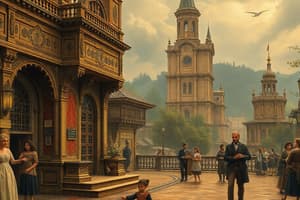Podcast
Questions and Answers
What did Stoics believe about life?
What did Stoics believe about life?
- Emotional response is essential for living.
- Life should be altered to achieve happiness.
- Acceptance of life as it is. (correct)
- We should constantly question our existence.
What was a significant factor that contributed to the start of the Renaissance in Italy?
What was a significant factor that contributed to the start of the Renaissance in Italy?
- The dominance of the Catholic Church.
- The invention of the telescope.
- Italy's trade links. (correct)
- The establishment of the Roman Empire.
How did the Church influence people's thinking during the period leading up to the Renaissance?
How did the Church influence people's thinking during the period leading up to the Renaissance?
- It encouraged scientific discovery.
- It supported the arts and humanities.
- It discouraged questioning by providing all the answers. (correct)
- It promoted the spirit of enquiry.
Which of the following was painted by Michelangelo?
Which of the following was painted by Michelangelo?
What was a key belief of Humanists during the Renaissance?
What was a key belief of Humanists during the Renaissance?
What did the Renaissance inspire people to do in relation to authority?
What did the Renaissance inspire people to do in relation to authority?
Which of the following reasons contributed to the Renaissance flourishing in Italy?
Which of the following reasons contributed to the Renaissance flourishing in Italy?
What spirit characterized the questioning approach of the Greeks and Romans?
What spirit characterized the questioning approach of the Greeks and Romans?
Which invention played a crucial role in the spread of Renaissance ideas?
Which invention played a crucial role in the spread of Renaissance ideas?
What was one consequence of the Renaissance in relation to exploration?
What was one consequence of the Renaissance in relation to exploration?
Flashcards are hidden until you start studying
Study Notes
Stoicism
- Stoics believed that individuals should accept life as it is.
Ancient World
- The Greeks and Romans actively questioned everything in a “spirit of enquiry.”
Medieval Period
- The Church discouraged independent thought, as it believed it held all the answers.
The Muslim World
- The Muslim world continued to explore the world through science and mathematics, while Europe was less interested.
The Renaissance
- The Renaissance was a rebirth of Greek and Roman ideas and the "spirit of enquiry."
- Humanists, key figures in the Renaissance, sought to rediscover ancient Greek and Roman knowledge.
- Humanists believed that humans were capable of great achievements.
The Italian Renaissance
- The Renaissance flourished in Italy due to several factors:
- Wealth from trade and commerce.
- Influence of humanists and the fall of Constantinople.
- The invention of the printing press.
- Italy’s strong trade connections.
Renaissance Art
- Michelangelo painted the ceiling of the Sistine Chapel, a masterpiece of Renaissance art.
Impact of the Renaissance
- The Renaissance encouraged exploration and the establishment of empires.
- It also encouraged people to challenge the authority of the Church.
Stoicism
- Stoics believed in accepting life as it is.
Greek and Roman Influence
- The Greeks and Romans had a "spirit of enquiry," meaning they constantly questioned everything.
Church Influence
- The Church discouraged critical thinking, believing they possessed all the answers.
Muslim World and Science
- The Muslim world continued to make scientific and mathematical advancements during a period when Europe was less interested.
The Renaissance
- The Renaissance was a revival of Greek and Roman ideas and the spirit of inquiry.
Humanism
- Humanists sought to rediscover ancient Greek and Roman knowledge.
- They believed humans had the potential for greatness.
Reasons for Renaissance in Italy
- Italy had strong financial resources.
- Humanists and the fall of Constantinople contributed to the intellectual climate.
- The printing press facilitated the spread of ideas.
- Italy's trade connections fostered cultural exchange.
Key Figures and Works
- Michelangelo painted the ceiling of the Sistine Chapel.
Impact of the Renaissance
- The Renaissance encouraged exploration and the creation of empires.
- It challenged the authority of the Church.
Studying That Suits You
Use AI to generate personalized quizzes and flashcards to suit your learning preferences.




